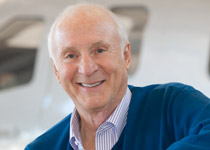Former TWA captain Barry Schiff has been flying for more than 45 years.
Last month I wrote about the worsening conditions associated with airline flying. I was certain that the subject would be considered controversial, that I would receive flak for appearing to denigrate my profession.
Thus far, I have received only sad notes of concurrence. Not one has disagreed with my conclusions (although a few took issue with some of the reasons).
The writers — almost all are airline pilots — felt that they had been betrayed by their profession. It seemed similar to what you might feel when abandoned by someone to whom you had dedicated your life. Perhaps this is because flying is an emotional issue to most pilots and is as much a part of their existence as those with whom they share their lives.
A friend once had an argument with his wife who complained that his flying was interfering with their relationship. She implied that he might someday have to choose between her and aviation. My friend cautioned her never to ask him to make such a choice, because she would not like the result.
Flying induces a magnetic pull, an attraction that lures and entices beyond any description that I can provide. It reminds me of when another friend was buying a chart at his local airport. While there he noticed a man wearing a filthy pair of overalls emblazoned with a patch indicating that he worked for a major airline.
Being the gregarious type, my friend initiated a conversation. "I see that you work for the airlines. What do you do? Are you a mechanic?"
Perhaps a little embarrassed, the man said, "Well, no. I empty the honey buckets. I operate the equipment that removes human waste from incoming aircraft."
Taken slightly aback, my friend commented, "You must get paid plenty to do a job like that."
"Are you kidding? I don't get paid jack."
My friend then said, "Well, at least the benefits must be good."
"Benefits? There aren't any. We have to buy our own medical insurance. Our retirement plan has been terminated. I only get one space-available pass per year for me and my family, and when we try to fly somewhere during my vacation, we always get bumped. The benefits stink."
My friend replied, "So why don't you quit and get a better job somewhere else?"
"What? Leave aviation?"
It is difficult to explain that kind of dedication to the world of flying, but those of us who aviate acknowledge its reality. It is why we go to the airport without any intention of flying. We go for the ambiance, to watch the windsock dancing in the breeze, to smell the avgas, to listen to the symphony of engines and propellers, to watch others take to the air and return from it, and perhaps more than anything else, to be with those who share our love.
To a large extent, flying as a vocation or avocation is enhanced by the people involved, those with whom we share a common bond and who understand without explanation what we do and why we do it. How can you make a nonpilot understand the thrill of bursting out of a cloud layer and into a purple sunset or descending out of overcast at minimums with the runway exactly where it is supposed to be? Laypeople have no concept of the stirring that such things create within us.
There is a tacit understanding by all who fly that we share a common mistress or master.
Those who saw the film The Spirit of St. Louis might recall when Charles Lindbergh and Bud Gurney spotted one another flying their dilapidated Jennies over Kansas. These gypsies of the sky landed one behind the other in a farmer's field and became lifelong friends. Flying was the glue, the common denominator that brought and held them together.
Pilots do not need to see their flying friends on a regular basis to maintain the camaraderie. That was an especially enjoyable aspect of airline life. Years might pass without seeing certain friends, but then by the sheer chance of crew scheduling, we would bump into one another in a dispatch office in Paris, a movie theater in Cleveland, or a bazaar in Cairo. It would be as if we had never been out of touch. The friendship would pick up where it had left off years ago.
In his book Lindbergh, A. Scott Berg said, "Aviation creates a brotherhood of casual acquaintances — people constantly coming and going." It is this brotherhood that made being an airline pilot so rewarding. Sure, I miss flying the big jets, preparing flight plans to exotic places, accepting the challenges posed by weather, but it is the people of TWA that I miss most.
Does general aviation create a similar brotherhood? I believe that it does, and this explains why I often drive to the local airport just to be with others who understand and share my passion.
A number of general aviation pilots who are professionals in other fields have told me that the friendships they have and maintain in aviation are their closest, warmest, and most meaningful.
Those who share the wonder of wings form an incredible and powerful bond, a brotherhood that those who do not fly cannot begin to fathom. It has enriched my life beyond my ability to fully explain.
Visit the author's Web site.



